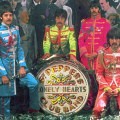- Hey Dullblog Online Housekeeping Note - May 6, 2022
- Beatles in the 1970s: Melting and Crying - April 13, 2022
- The Beatles, “Let It Be,” and “Get Back”: “Trying to Deceive”? - October 22, 2021

Richard Goldstein, back in the day.
The Washington Post has published this intriguing piece about how a 22-year-old critic came to write a negative review of Sgt. Pepper’s Lonely Hearts Club Band for the New York Times when the album was originally released. Richard Goldstein, the critic in question, has the complete review on his website: you can read it here.
Although he was a young freelancer at the time, Goldstein was an important figure in 1960’s music criticism. Robert Christgau says that Goldstein “invented rock criticism. He was the first rock critic. I mean, it turns out Paul Williams was publishing his zine [Crawdaddy] and there were other things happening, but without question, he was the most visible.”
A few excerpts from Goldstein’s comments (it’s worth remarking, among all the negatives, that he refers to “A Day In The Life” as “one of the most important Lennon-McCartney compositions” and “a historic Pop event”):
- “Like an over-attended child “Sergeant Pepper” is spoiled. It reeks of horns and harps, harmonica quartets, assorted animal noisesand a 41-piece orchestra. . . .”
- “The obsession with production, coupled with a surprising shoddiness in composition, permeates the entire album. There is nothing beautiful on “Sergeant Pepper.” Nothing is real and there is nothing to get hung about.”
- “. . . for the first time, the Beatles have given us an album of special effects, dazzling but ultimately fraudulent.”
I found Goldstein’s current comments on his 1967 review more interesting than the review itself. He now has this to say about his reasons for attacking the album:
“I remember being sort of horrified by the album, being determined with that sort of narcissistic frenzy that young men can have. To, you know, shake them up and force them to actually make rock and roll again. Like they would be listening. That the Times was all powerful and therefore they would say oh we’ve made a mistake, we’re going to go back to singing ‘Long Tall Sally’ or ‘now I’ll never dance with another.’ I wasn’t really interested in the prophetic aspect of ‘Sgt. Pepper.’ I was interested in the violation of the rules and I didn’t like it, and that’s what I look back on with a lot of reflection.”
The Washington Post writer summarizes Goldstein’s 2017 reflections this way: “He didn’t understand “Pepper” musically when it was released, and he found his turmoil over his sexuality — he wouldn’t come out until the 1970s — didn’t allow him to embrace the attitude of the record, which he says defied the aggressive, masculine approach of so much rock.”
Which chimes with many things we’ve said at Hey Dullblog about the Beatles — and McCartney in particular — having “girl cooties” in the eyes of many

Richard Goldstein, today.
critics and listeners. If what you want is “straight” rock and roll that affirms the importance of the young, aggressively “male” point of view, Sgt. Pepper’s definitely isn’t your album. Its sympathies are all over the place, extending even to the prospective retiree of “When I’m 64” and the middle-aged parents of “She’s Leaving Home.” But just when you think it’s all vaudeville storytime, the Beatles drop “Within You And Without You” and “A Day In The Life” into the mix. Sgt. Pepper’s stubbornly refuses to be any one thing, or to belong to any one time.













This germ is in the same class of bullshit critic as those movie critics who worship the “gritty realism” of Scorsese (so long as it’s Mean Streets or Goodfellas, but not Hugo), but sneer at, say, Amadeus. They’re simply insecure boys who, because they get erections seeing dudes shiv one another, conflate that with “real artistry.” T.S. Eliot was right — your opinion of a classic is really a verdict on whether you know what the fuck you’re talking about.
http://3.bp.blogspot.com/-rhhmBLPmR1Q/UTzuRshqCdI/AAAAAAAAAj4/z8c_nx9-E_s/s1600/tgfawtm_thecritic.jpg
Luv it, Sam, where did you find it? Who is the graphic artist?
Interesting approach of the Sgt. Pepper phenomenon, thanks for sharing, Nancy.
.
It seems that today the experiences of others determine the importance and the individual experience of art. I still don’t get it – should the timelessness of Sgt. Pepper impact my listening experience? How far gone are we if the historical relevance or insignificance is going to influence my feelings? I luv the approach of Candy Leonard with ‘Beatleness’, I don’t see how books with fan’s opinions on Sgt. Pepper are relevant and informative, but also seem immaterial to the personal appreciation of the art. What I do like is the way Geoff Edgers digs into the Sgt. Pepper review of Mr. Goldstein, especially after McCartney recently mentioned his New York Times ‘hate’ review.
.
My problem with Goldstein’s argument is that it belongs in the Wenner’s Rolling Stone league. These are argument from guys in a position to promote their ideas of people, music and rock culture as the standard anyone should pay for and conform to. Fifty years on things are not getting better all the time, it’s even worse. Goldstein admits he had a personal agenda, arising out of psychological and social inhibitions which limited his cultural window of tolerance for change.
He thought masculine sexists rock’n’roll should be where the Beatles stayed. But no, they didn’t, artistically they moved on, they expressed a vision of their age and time, in new and fresh music, sound and lyrics. The youthful, wonderful, lively, hips moving and ass shaking music of “A Hard Day’s Night” was left behind and instead we get a sweet “I’m So Tired”- drugs’ laziness and sluggish like sing-a-long “Lucy In The Sky with Diamonds” of which the music doesn’t match its reputation, at all. (this is paraphrasing in agreement: Mikael Wood, pop music critic for the LA Times, (http://www.latimes.com/entertainment/music/la-et-ms-sgt-pepper-notebook-20170519-story.html) “Within You And Without You” and “When I’m Sixty Four” weren’t masculine enough for the not yet out of the closet critic, who thought he could abuse the standing of the New York Times to promote and push the artistic output of a commercial but artistically really free band of musicians. That, to me it is an appalling attitude on display. Guys like Wenner and Goldstein act like little pathetic American Gods who believe they can fuck Art into submission, and will not hold back and cherish the off-spring.
.
By doing this Goldstein displays that hateful, (to me) typical American wennerian, trumpian, talk-radio narcissism. The sad thing is, it works. Now in 2017 we are all media-talking a negative critique and pain a person couldn’t control fifty years ago – to me it echoes Matt Taibbi obituary in Rolling Stone on Fox-boss Ailes, and how we seem to have become consumers and abusers of media like as if the majority of the people of the USA (and for that matter a majority of the folks living in Western Europe) “are a hate-filled, paranoid, untrusting, book-dumb and bilious people” and their (ours) chief source of recreation is enjoying slinging insults and threats at each other or observing these mud fights of so called free-speech.
Any critic is entitled to its opinion, but to me their professional duty is that they themselves or in cooperation with their editors should reflect on inner motivations before publishing a major critique or commentary, looking backward Goldstein abandoned of professional decency and civic duty as a journalist.
[ http://www.rollingstone.com/politics/features/taibbi-roger-ailes-was-one-of-the-worst-americans-ever-w483013 ] Maybe there is a historical relevance to the article and video of Geoff Edgers, but that judgement call I leave to the historians.
.
Goldstein, the journalist, at least admits he ‘fucked up’ [ https://www.washingtonpost.com/video/entertainment/the-ny-times-critic-who-panned-sgt-peppers-in-1967-comes-around/2017/05/11/6eca7690-35a6-11e7-ab03-aa29f656f13e_video.html ], Wenner still has to explain and excuse his journalistic below par performance with ‘Lennon Remembers’ and how he forever fucked up most poor fan’s perceptions of the Beatles’ story and the appreciation (read Erin Torkelson Weber’s ‘The Beatles and The Historians’) and experience of Beatles’ (solo) music. Recently a friend told me he and his wife spent a night listening closely to Abbey Road time and again to find out that indeed it was predominantly the work of McCartney. Thru reading Norman’s biography of McCartney he found out it Paul wasn’t John’s little sweet creative baby brother following and in support of Lennon’s genius. I thought he was wiser… I looked at him with frantic eyes. As if all this is not enough, Wenner still promotes his taste as the cultural norm thru his Rock ‘n Roll Hall of Fame.
.
– – – –
.
I’m sure, I will have a lot of fun listening to the Giles Martin remix of Sgt. Pepper, in a way I haven’t done in years, and then I will get into “A Hard Day’s Night” again, and listen to the much more advanced white album and in agreement with Goldstein I am gonna dig “Let It Be naked”. Quite surely I will then realize what a magnificent achievement of sound and vision Sgt. Pepper is and was, as the album belongs to a specific cultural age and space, as it’s fifty years anniversary proves.
.
Yes, Nancy I hesitate to agree with your idea, that Sgt. Pepper “stubbornly refuses to be any one thing, or to belong to any one time”. Parroting Mikael Wood, I think Sgt. Pepper embodies the hippie idealism of the Summer of Love and it marked an important moment in the evolution of psychedelic art and of progressive rock. It also helped cement the very idea of the LP as music’s primary canvas. Sgt. Pepper is a great reflecting its time and symbolic for broadening (rock) music’s scope, as such “Lemonade” by Beyoncé is a modern equal and grand-child, who does not stand in Sgt. Pepper granddaddy’s shadow, but shines its brilliant light on granddaddy.
Now, that’s a different story altogether, a story of our current sad and racist’s times.
= = = = = = = = =
The cartoonist B. Kliban.
Sir HF, I give Goldstein credit for reflecting on why he reacted to the album as he did back in 1967 and sharing that with the interviewer. I wish more critics would do the same.
.
Rob, I don’t see a piece of art speaking to its time and being of its time as at odds with its also speaking across time. Art that lasts has something to say that isn’t limited to a particular time and place, though it may also tell us quite a bit about the time and place where it originated.
.
To give one non-music example, “A Christmas Carol” couldn’t be more specifically set in and about Victorian England, yet new versions continue to be produced, and here in Chicago the Goodman Theater’s stage adaptation continues to sell out year after year. There’s something about that story that continues to resonate with people today, and the fact that the story was making political points about its own time sits comfortably beside that.
Mmmm!? You wrote ‘stubbornly refuses to belong to any one time”. The music is unrelated to current music scene… it is our generation and older people that buy the album and listen to it on e.g. Spotify. The music belongs to the mid-sixties, except from a few tunes. The compositions may get e make-over and become popular again, that’s why I think I am going to love the Giles Martin Remix, as I did the remix of the Yellow Submarine by Cobbin, Hicks and Styles.
.
Personally I think the Victorian music from ‘A Christmas Carol’ is not the reason why people come and go very year, it is all the Wonderfull romantic, family, and traditional additional associations and emotions, and most likely the music today is very differently then in Victorian England.
.
Art speaks individually that’s true, but that doesn’t make that piece of art connect or belong to the times the observer is from or in – it is a human that is touched. Maybe we should ask the marketing team of Apple Corp.
Well, we disagree about “Pepper,” for sure. I don’t think it’s only of its own time, any more than any art that has endured. Art that endures does connect across time, or we wouldn’t care about it.
.
I was giving “A Christmas Carol” as a non-music example; there is no music in it, originally, since it was a Dickens story. My point was that people respond to the narrative and characters of “Carol” today, even though it’s explicitly about Victorian England and definitely spoke to that time.
.
I think it’s a false dichotomy to say that because a work of art was important to its own time and spoke strongly to it that it can ONLY connect to that time.
Bless you for posting this, Nancy. And bless this dude Goldstein for copping to his own bullshit. There certainly seems to be a pattern here of men who struggle with their sexuality and take it out on the Beatles. I’m not sure Sgt. Pepper is more “alternative” than the previous Beatles catalogue (were those Little Richard and Shirelles covers really so macho?), but I suppose it’s more explicit. There is a song about getting high and masturbating with your friends… and one where John and Paul share a sexual fantasy and then climax together, so yeah, I’ll concede the point.
*
And I can understand how Goldstein dragged the Beatles into his own personal turmoil. Lots of people do this with the Beatles (of course, that’s kinda the point of art!) and this album in particular speaks to so many. Sgt. Pepper touches on young adults’ emancipation from their parents, the use of mind-expanding drugs, the beginnings of globalization through the introduction of Indian culture/music to a Western audience, men treating women better (and taking responsibility for it!), free love (as they used to call it), same-sex love, Jesus what were they NOT on the cutting edge of?
*
Frankly, I think it’s an insult to Sgt. Pepper to call it a symbol of the Hippies or the Ideals of the Summer of ’67. I mean, I get what people mean by that. But I think that (perhaps inadvertently) undermines the artistry of the songwriting on the album. I downloaded the new iTunes mix today and listened to a bit this morning. She’s Leaving Home, a song I’ve obviously heard a million times before, literally had me sobbing while I cleaned my house. Not because I’m personally leaving home (or have a child leaving home). Just because it’s so beautiful and so real and so truthful. Very, very few people can write something so simple and emotionally devastating at the same time. Very, very few have the ability to connect with an audience on such a universal level. Not choosing sides, sympathetic to everyone… That’s great writing, people.
“WALHFMF” is about masturbating? :/ I honestly never thought of it that way, I always just thought it was just about buddies sharing a joint.
In what song do J & P share a sexual fantasy? Please elaborate.
This is all intriguing, and a bit confusing.
[…] Critic Richard Goldstein’s 1967 pan of Sgt. Pepper […]